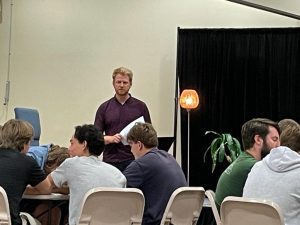The community morning tea took place on Wednesday morning and was attended by about 15 people all up including leaders. Some of the attendees were regular and a couple were attending for the first time. Moore College students were available to attend to the guests, serving teas and coffees. The church put on a spread of baked food and the atmosphere in the room was warm. The purpose of the event was to revive weekly morning bible studies for the older Christians which had stopped because of Covid and give the guests a taste of the regular meetings.
However, being the first one, we did not have bible studies conducted as usual. Instead, the time was used to mingle and get to know each other and later on Graham, who runs the bible studies, briefed us on the regular schedule of the meetings. The regular attendees had a chance to say why they love bible studies and a number of them appreciated the opportunity to discuss the word of God and do community. Graham then invited Edward Happer to give a testimony of how he became a Christian. Edward also shared about how he came to consider vocational ministry having started out in the army as a musician. He encouraged the seniors to be deliberate in meeting younger people in the congregation because senior Christians were strong witnesses to him growing up. Overall, it was a wonderful morning, giving us the Moore college students a taste of the ministry to senior citizens at the Nuremburn-Cammery church.
Read more . . .
















